The Rudder (2 vols.)
Digital Logos Edition
Overview
The Rudder (Greek: “Pedalion”) is a classic compilation of the holy canons or Orthodox canon law. Originally assembled by Nicodemus the Hagiorite and Agapius the Monk on Mount Athos in 1800, this work includes a dedication to Orthodox Christians from both Nicodemus and Agapius, along with a letter and recommendation on this edition from the Patriarch of Constantinople (ca. 1802) NEOPHYTOS VII. The present edition was translated into English from the fifth edition by Denver Cummings in 1957, and re-published at that time by the Orthodox Christian Educational Society of Chicago, Illinois. The Rudder is so named because of the symbolism often employed in the Eastern Orthodox tradition of the Catholic Church of Jesus Christ as a ship at sea. The master of the vessel is Jesus Christ, the sailors the holy Apostles and their successors, and the passengers all Orthodox Christians. The sea is symbolic of our present life, with the rudder of the ship representative of these holy canons, keeping the Church on course and safe from temptation.
This work includes the 85 Canons of the Holy Apostles, the Canons of the first seven Ecumenical Councils, the Canons of the Regional Synods, the Canons of the Holy Fathers (e.g., of Sts. Basil the Great, Gregory of Nyssa, and Cyril of Alexandria), and a number of various instructions and forms for letters.
By adding this pivotal work to your Logos library, you can easily do searches throughout the canons for shared themes or topics, cross-references with scriptural citations, and even reference works by the Church Fathers that touch on the same topics as their canons (as with Basil the Great and Athanasius of Alexandria, for example). Whether you are a scholar interested in the finer issues (and interpretations) of canonical law in the Orthodox tradition, or simply a layperson wanting to know more about how the early Church addressed various issues of piety and worship, the Logos edition of the Rudder (in both Greek and English) is a must-have collection.

Key Features
- All original introductory information included (in both Greek and English)
- Footnotes preserved throughout the text
Product Details
- Title: The Rudder (Pedalion) Collection (2 vols.) in Greek and English
- Authors: Nicodemus the Hagiorite and Agapius the Monk
- Translator: Denver Cummings
- Volumes: 2
- Pages: 1740
Individual Titles

The Rudder (Pedalion) of the Metaphorical Ship of the One Holy Catholic and Apostolic Church of Orthodox Christians
- Authors: Nicodemus the Hagiorite and Agapius the Monk
- Translator: Denver Cummings
- Publisher: Orthodox Christian Educational Society
- Publication Date: 1957
- Pages: 1084

The Rudder (Pedalion) of the Metaphorical Ship of the One Holy Catholic and Apostolic Church of Orthodox Christians: Greek Text
- Author: Nicodemus the Hagiorite and Agapius the Monk
- Publication Date: 1886
- Pages: 656
This title is included in the following collections
You can save when you purchase this product as part of a collection.
Logos 7 Orthodox Gold Legacy L...
$849.99$849.99Logos 6 Orthodox Gold Legacy L...
$849.99$849.99Logos 8 Orthodox Platinum Lega...
$1,499.99$1,499.99Logos 6 Orthodox Platinum Lega...
$1,499.99$1,499.99
- $1,499.99
- $1,499.99
- $2,999.99
- $2,999.99
- $2,999.99
- $4,749.99
- $21,749.99
- $23,999.99
- $24,999.99
About the Authors
Nicodemus the Hagiorite (aka Nicodemus of the Holy Mountain and Nicodemus the Athonite) was an Orthodox Christian monastic, author, canonist, author of numerous Lives of the Saints and liturgical poetry, and compiler/editor of pivotal Orthodox writings such as the Philokalia, the Rudder, and the collected writings of both St. Symeon the New Theologian and St. Gregory Palamas. Born in Naxos, Greece in 1749, Nicodemus was tonsured as a monk at the Dionysiou monastery on Mount Athos in 1775. He reposed in the Lord in 1809 and was glorified as a Saint by the Orthodox Church in 1955. His feast day is celebrated on July 14.
Agapius the Monk was a friend of Nicodemus, fellow editor of the original 1800 Greek edition of the Rudder, and fellow monk (a Hieromonk or “priest-monk”) on Mount Athos.
Reviews
6 ratings
Daniel Mcliver
5/14/2023

Ordice Gallups, Obl.S.B.
8/24/2018
Rebekah Sheldon
3/29/2018
i don't have logos software -- if I buy this download, can I still read it? Is it a pdf? What is the extension?
Christian R. Proano M.
3/19/2018
This resource is invaluable, It is not easy to find a collection of canons and this seen to be the standard compilation in the English language. This 2 volume edition is one in English and the other in Greek. Having read it (in English), please remember that there is a pastoral dimension of these canons, and its current application in the Spirit of Orthodoxy is not according to the gravity of the fault or sin, but according to the position of the heart in relation to God. Also, there are lengthy excursuses of different topics that must be read with a grain of salt since they were written by a person that ended his life outside of Orthodox communion. The interpretation of the canons may be helpful but not necessary in many cases.Michael T. Fox
1/20/2017
armazi aslamazaSvili
12/9/2015
hellow, I live in Caucasus Georgia, how to buy this book? Is Instruction online shoping?Christos Milonas
8/4/2015
This is an important book that should allready circulate in all orthodox congregations. I have e-mailed logos about realese date but no reply. Waited for over 6 months allready. Is there a problem with the production maybe? This text allready exists in english so it shouldn't be too difficult to put it in print again. Made a pre-order but so far no book. Only telephone calls from logos trying to sell other books!
Aureo Ferreira
3/24/2015
A real treasure for those studying the canons of the Orthodox Church of Christ.
